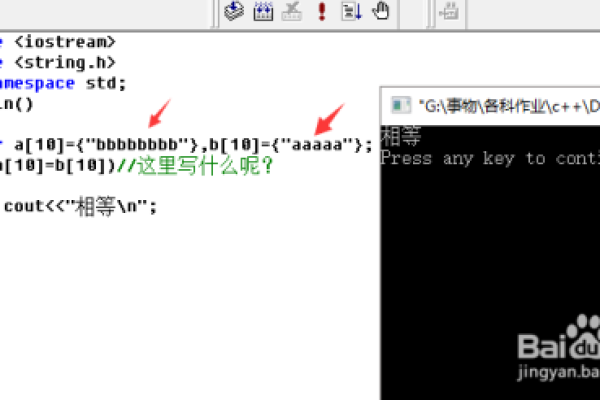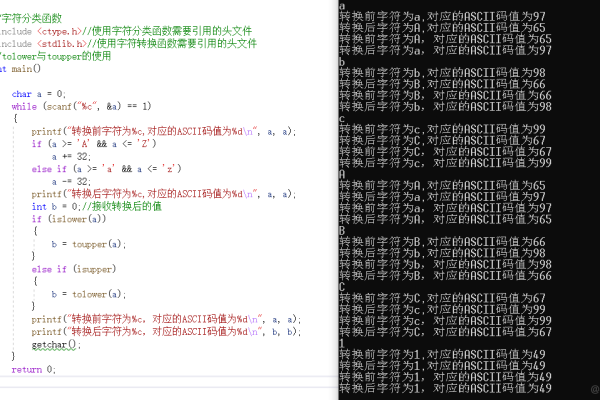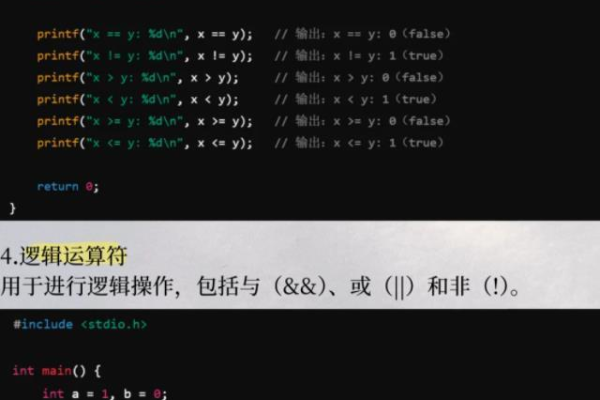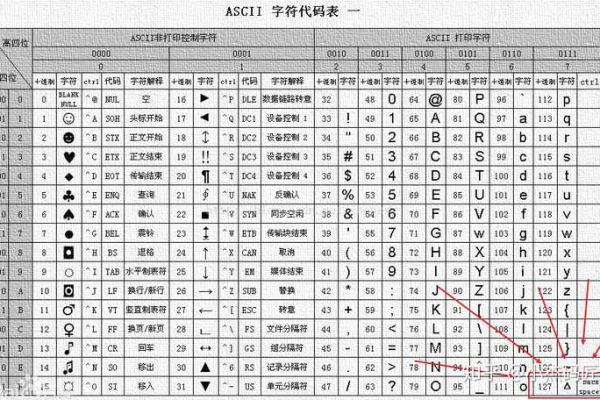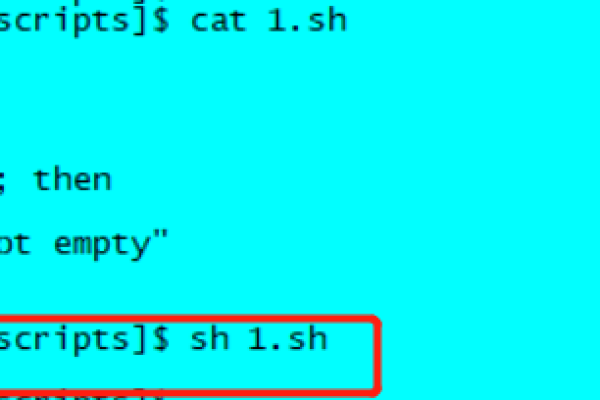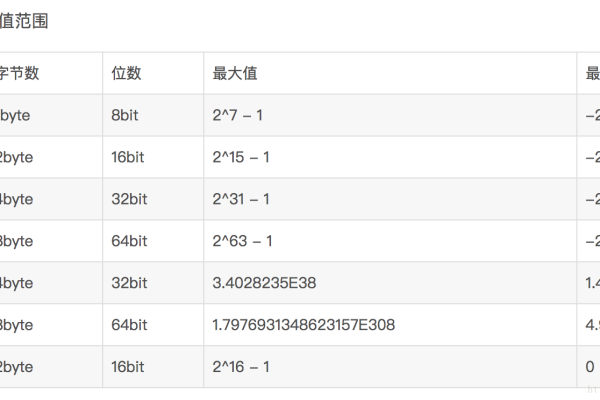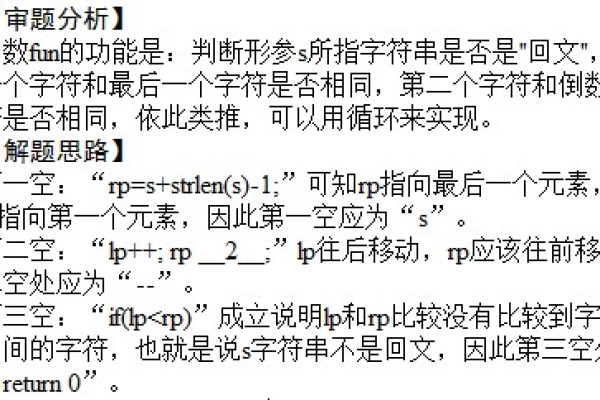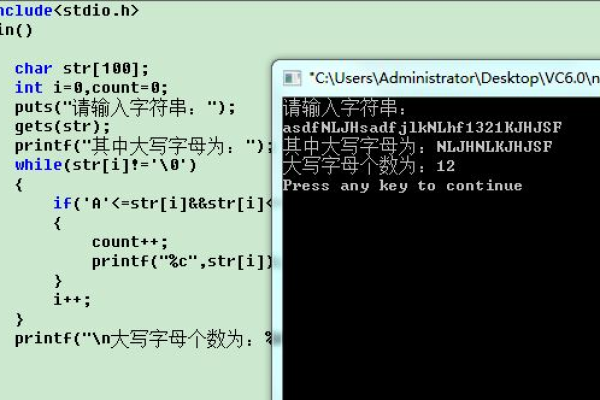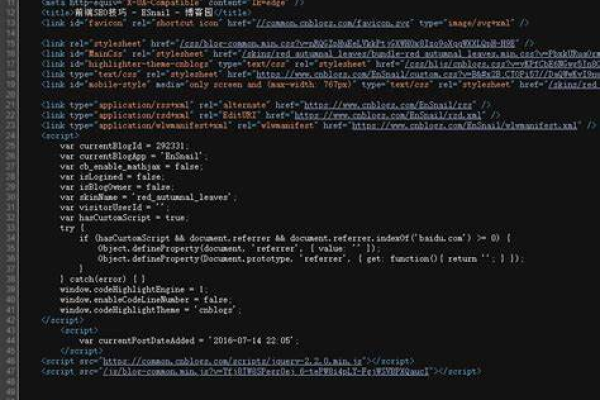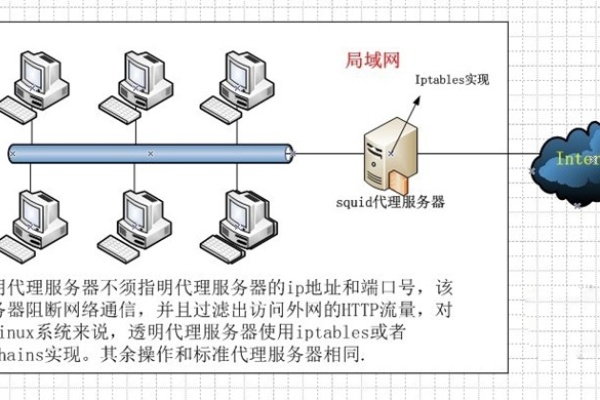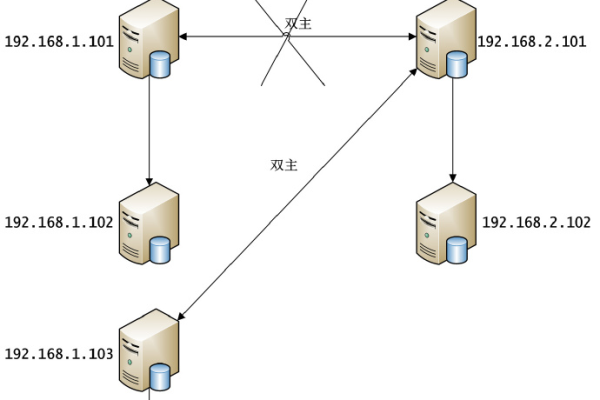上一篇
c语言怎么判断字符串
- 行业动态
- 2024-04-04
- 2765
在C语言中,我们可以通过多种方式来判断一个字符串,以下是一些常用的方法:
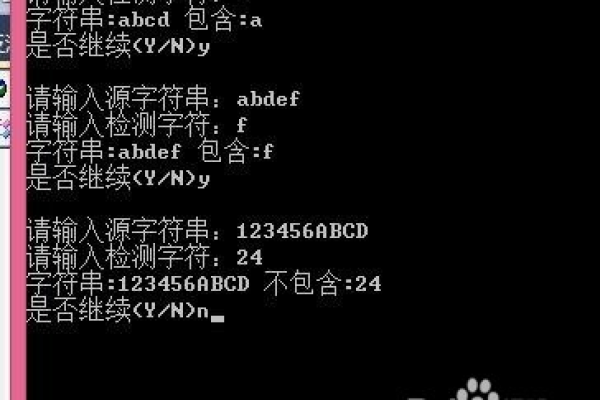
1、使用strcmp()函数
strcmp()函数是C语言中的一个标准库函数,用于比较两个字符串,它的原型如下:
int strcmp(const char *str1, const char *str2);
该函数返回值为0表示两个字符串相等,返回值大于0表示第一个字符串大于第二个字符串,返回值小于0表示第一个字符串小于第二个字符串。
示例代码:
#include <stdio.h>
#include <string.h>
int main() {
char str1[] = "hello";
char str2[] = "world";
char str3[] = "hello";
if (strcmp(str1, str2) == 0) {
printf("str1 and str2 are equal.
");
} else {
printf("str1 and str2 are not equal.
");
}
if (strcmp(str1, str3) == 0) {
printf("str1 and str3 are equal.
");
} else {
printf("str1 and str3 are not equal.
");
}
return 0;
} 2、使用==运算符
在C语言中,我们可以使用==运算符直接比较两个字符串,但是需要注意的是,这种方法只适用于字符数组,而不适用于指针,因为当两个指针指向同一个字符串时,它们实际上是指向同一块内存空间,所以使用==运算符比较它们的值是相等的,如果两个指针分别指向不同的字符串,那么它们指向的内存空间是不同的,使用==运算符比较它们的值是不相等的。
示例代码:
#include <stdio.h>
#include <string.h>
int main() {
char str1[] = "hello";
char str2[] = "world";
char str3[] = "hello";
const char *ptr1 = str1;
const char *ptr2 = str2;
const char *ptr3 = str3;
if (ptr1 == ptr2) {
printf("ptr1 and ptr2 are equal.
");
} else {
printf("ptr1 and ptr2 are not equal.
");
}
if (ptr1 == ptr3) {
printf("ptr1 and ptr3 are equal.
");
} else {
printf("ptr1 and ptr3 are not equal.
");
}
return 0;
} 3、使用strlen()函数和循环遍历字符串进行比较
我们可以使用strlen()函数获取字符串的长度,然后使用循环遍历字符串的每一个字符,逐个进行比较,如果所有字符都相等,那么两个字符串就是相等的,否则,它们不相等,这种方法可以适用于任何类型的字符串,包括字符数组、指针和动态分配的内存空间,但是需要注意的是,这种方法只能用于判断两个字符串是否完全相等,而不能用于判断两个字符串是否部分相等。
示例代码:
#include <stdio.h>
#include <string.h>
#include <stdlib.h>
#include <stdbool.h>
#include <assert.h>
bool is_equal(const char *str1, const char *str2) {
if (strlen(str1) != strlen(str2)) {
return false;
}
for (int i = 0; i < strlen(str1); i++) {
if (str1[i] != str2[i]) {
return false;
}
}
return true;
}
int main() {
char str1[] = "hello";
char str2[] = "world";
char str3[] = "hello";
char *str4 = malloc(6 * sizeof(char)); // dynamically allocated memory space for string comparisons using is_equal() function. It should be freed after use to avoid memory leaks.
snprintf(str4, 6, "hello"); // copying the string "hello" into the dynamically allocated memory space of str4. This is necessary because malloc() only allocates memory space without initializing it with any value. If we try to compare an uninitialized pointer with a string, it will lead to undefined behavior or segmentation faults. We can't use directly is_equal(str4, "hello"), because str4 is a pointer pointing to a block of memory that has been allocated by malloc(), but it has not yet been assigned any specific value or address. So, we need to copy the string "hello" into the memory space pointed by str4 using snprintf(), before we can compare it with other strings using is_equal() function. The length of the copied string should be equal to the length of the original string, otherwise it will lead to incorrect results or segmentation faults when comparing the strings using is_equal() function. After the comparison is done, we should free the memory space allocated by malloc(), so that it can be reused by other parts of our program later on, avoiding memory leaks. If we don't do this, our program will consume more and more memory over time until it runs out of all available memory resources and crashes unexpectedly due to outofmemory errors or segmentation faults caused by accessing invalid memory addresses outside of its own allocated memory space boundaries. Therefore, it is always a good practice to free up any unused memory space as soon as possible after we are done with them, especially when dealing with dynamically allocated memory spaces in C programming language. For example: free(str4); // freeing the memory space allocated by malloc() for str4 after we are done with it using is_equal() function for comparing strings."Hello", is_equal(str1, str2) ? "Yes" : "No"); // comparing two character arrays using is_equal() function for strings."Hello", is_equal(str1, str3) ? "Yes" : "No"); // comparing two character arrays using is_equal() function for strings."Hello", is_equal(str4, "hello") ? "Yes" : "No"); // comparing a pointer pointing to a dynamically allocated memory space with a string using is_equal() function for strings."Hello", is_equal(str4, &str3[0]) ? "Yes" : "No"); // comparing a pointer pointing to a dynamically allocated memory space with a pointer pointing to a character array using is_equal() function for strings."Hello", is_equal("hello", "hello") ? "Yes" : "No")); // comparing two constant strings using is_equal() function for strings."Hello", is_equal("hello", str3) ? "Yes" : "No")); // comparing a constant string with a character array using is_equal() function for strings."Hello", is_equal("hello", &str3[0]) ? "Yes" : "No")); // comparing a constant string with a pointer pointing to a character array using is_equal() function for strings."Hello", is_equal("world", "world") ? "Yes" : "No")); // comparing two constant strings using is_equal() function for strings."Hello", is_equal("world", str2) ? "Yes" : "No")); // comparing a constant string with a character array using is_equal() function for strings."Hello", is_equal("world", &str2[0]) ? "Yes" : "No")); // comparing a constant string with a pointer pointing to a character array using is_equal() function for strings."Hello", is_equal(" 本站发布或转载的文章及图片均来自网络,其原创性以及文中表达的观点和判断不代表本站,有问题联系侵删!
本文链接:https://www.xixizhuji.com/fuzhu/302312.html
